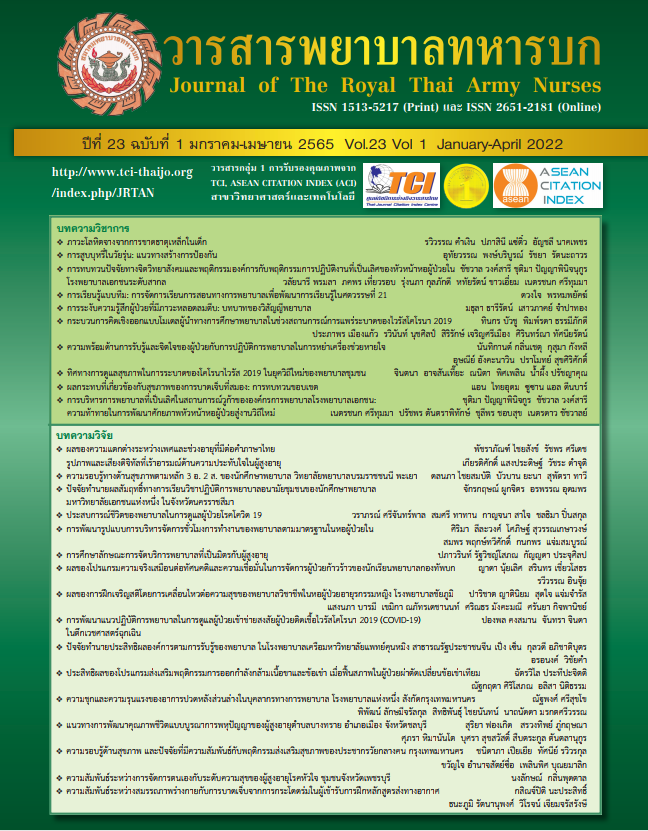A Study of The Age-Friendly Characteristic Services
Keywords:
age-friendly, characteristic servicesAbstract
The purpose of this research was to study the age-friendly characteristic services. The Delphi technique was used in this study. Participants were 19 experts including 2 hospital directors involved in setting up management policies within the hospitals, 5 directors of nursing or deputy directors of nursing, 5 nursing managers, 5 registered nurses at practitioner level, and 2 architects in the field of environmental design for the elderly. The research methodology was divided into 3 steps. The first dealt with interviewing the experts about the age-friendly characteristic services, the second writing a questionnaire based on the interviews before asking the experts to complete it, and the third the analysis of the data obtained from the second step translated into mathematical terms: mean and interquartile range. The experts were asked to complete the revised questionnaire whose data were analyzed and translated into the same mathematical terms.
Downloads
References
Institute for Population and Social Research, Mahidol University. Thai health; 2017. (in Thai).
Office of the National Economic and Social Development Board. Population projections for Thailand 2010-2040; 2013. (in Thai).
National Statistical Office. Health and Welfare Survey; 2015. (in Thai).
Nantsupawat W, Sirivattanamatanon J, Hornboonherm P. Mental health of the elderly. Journal of Nurses’ Association of Thailand, North-Eastern Division 2009; 27(1): 27-32. (in Thai).
Institute of Geriatric Medicine, Department of Medical Service, Ministry of Public Health. Standard and operational guide for quality elderly clinics; 2013. (in Thai).
Kulariyasup W. Guidelines for building renovate with facilities for elderly and disabled persons: A case study of out-patient department [dissertation]. Nakhon Ratchasima : Suranaree University of Technology; 2012. (in Thai)
Theeranut A, Saensom T, Methakanjanasak N, Ruaisungnoen W. Development of a holistic continuing care model for elderly with chronic illnesses: A case study in one tertiary care hospital. Journal of Nurses’ Association of Thailand, North-Eastern Division 2009; 27(2): 65-77. (in Thai).
Australian Health Ministers’ Advisory Council (AHMAC). Age-friendly principles and practices. Managing older people in the health service environment. Developed on behalf of the Australian ministers’ Advisory Council (AHMAC) by the Care of Older Australians Working group, Victorian Department of Human Services, Melbourne, Victoria; 2004.
Chiou S.,-T.,Chen L.,-K. Taiwan’s framework of age-friendly hospitals and health services. Archives of Gerontology and Geriatrics 2009; 49(2): S3–S6.
Macmillan T. The Delphi technique. In the annual meeting of the California Junior Colleges Associations Committee on research and development; May 3-5; California: Monterey 1971.
Kim YS, et al. Development of the Korean framework for senior-friendly hospitals: a Delphi study. BMC Health Services Research 2017; 17: 528.
World Health Organization. Towards Age-friendly Primary Health Care; 2004.
Atiratpaisal R, Wivatvanit S. Nursing competency in gerontological nursing. Journal of Boromarajonani College of Nursing, Bangkok 2010; 26(1). (in Thai)
Artsanthia J, Kampraw P. Modality of care the older adults in community. Journal of The Royal Thai Army Nurse 2014; 15(3): 123-127. (in Thai)
Downloads
Published
How to Cite
Issue
Section
License
Copyright (c) 2022 Journal of The Royal Thai Army Nurses

This work is licensed under a Creative Commons Attribution-NonCommercial-NoDerivatives 4.0 International License.
บทความหรือข้อคิดเห็นใดใดที่ปรากฏในวารสารพยาบาลทหารบกเป็นวรรณกรรมของผู้เขียน ซึ่งบรรณาธิการหรือสมาคมพยาบาลทหารบก ไม่จำเป็นต้องเห็นด้วย
บทความที่ได้รับการตีพิมพ์เป็นลิขสิทธิ์ของวารสารพยาบาลทหารบก
The ideas and opinions expressed in the Journal of The Royal Thai Army Nurses are those of the authors and not necessarily those
of the editor or Royal Thai Army Nurses Association.






